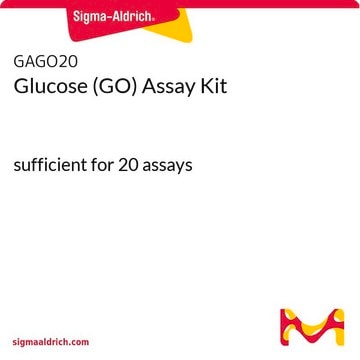MAK329
L-Lactate Assay Kit
sufficient for 100 colorimetric tests
Sinónimos:
L-Lactic Acid Assay Kit, Lactate Quantification Kit
Iniciar sesiónpara Ver la Fijación de precios por contrato y de la organización
About This Item
UNSPSC Code:
12161503
NACRES:
NA.84
Productos recomendados
usage
sufficient for 100 colorimetric tests
input
cell
plasma
serum
solution(s) (collagen)
detection method
colorimetric
relevant disease(s)
endocrinological disorders, diabetes; cancer
storage temp.
−20°C
General description
Lactate is generated by lactate dehydrogenase (LDH) under hypoxic or anaerobic conditions. Monitoring lactate levels is, therefore, a good indicator of the balance between tissue oxygen demand and utilization and is useful when studying cellular and animal physiology. Simple, direct and automation-ready procedures for measuring lactate concentration are very desirable.
Application
The L-Lactate Assay Kit may be used for:
- Cancer Research
- Diabetes Research
- Endocrinological Disease Research
Features and Benefits
Sensitive Detection Range: Detect L-Lactate levels accurately across a wide range, from 0.05 mM to 2 mM, using only 20 μL of sample in a 96-well plate setup, ensuring highly sensitive analysis with minimal sample requirement.
Simplified Process: Experience a streamlined process with the addition of only a single working reagent and a 20 minute room temperature reaction, reducing complexity and saving valuable time and effort.
Compatibility with High-Throughput Systems: Easily incorporate our kit into high-throughput handling systems, ensuring smooth and accurate processing, enhancing efficiency in your laboratory workflow.
Simplified Process: Experience a streamlined process with the addition of only a single working reagent and a 20 minute room temperature reaction, reducing complexity and saving valuable time and effort.
Compatibility with High-Throughput Systems: Easily incorporate our kit into high-throughput handling systems, ensuring smooth and accurate processing, enhancing efficiency in your laboratory workflow.
Suitability
Suitable for lactate determination in serum, plasma, and cell media samples.
Principle
The Lactate Assay Kit is based on lactate dehydrogenase catalyzed oxidation of lactate, in which the formed NADH reduces a formazan (MTT) reagent. The intensity of the product color, measured at 565 nm, is proportionate to the lactate concentration in the sample.
Other Notes
For additional information on our range of Biochemicals, please complete this form.
Storage Class
10 - Combustible liquids
Certificados de análisis (COA)
Busque Certificados de análisis (COA) introduciendo el número de lote del producto. Los números de lote se encuentran en la etiqueta del producto después de las palabras «Lot» o «Batch»
¿Ya tiene este producto?
Encuentre la documentación para los productos que ha comprado recientemente en la Biblioteca de documentos.
Los clientes también vieron
Katharina Richard et al.
The Journal of experimental medicine, 218(2) (2020-11-21)
Two cosegregating single-nucleotide polymorphisms (SNPs) in human TLR4, an A896G transition at SNP rs4986790 (D299G) and a C1196T transition at SNP rs4986791 (T399I), have been associated with LPS hyporesponsiveness and differential susceptibility to many infectious or inflammatory diseases. However, many
Ana Zúñiga et al.
ACS synthetic biology, 10(12), 3527-3536 (2021-12-02)
Bacteria equipped with genetically encoded lactate biosensors are promising tools for biopharmaceutical production, diagnostics, and cellular therapies. However, many applications involve glucose-rich and anoxic environments, in which current whole-cell lactate biosensors show low performance. Here we engineer an optimized, synthetic
Triiodothyronine prevents tissue hypoxia in experimental sepsis: potential therapeutic implications.
Iordanis S Mourouzis et al.
Intensive care medicine experimental, 9(1), 17-17 (2021-04-10)
Tia R Tidwell et al.
Cancer & metabolism, 10(1), 9-9 (2022-05-17)
Most in vitro cancer cell experiments have been performed using 2D models. However, 3D spheroid cultures are increasingly favored for being more representative of in vivo tumor conditions. To overcome the translational challenges with 2D cell cultures, 3D systems better
Nuestro equipo de científicos tiene experiencia en todas las áreas de investigación: Ciencias de la vida, Ciencia de los materiales, Síntesis química, Cromatografía, Analítica y muchas otras.
Póngase en contacto con el Servicio técnico

